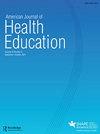个人健康素养与生活简单7:动脉粥样硬化的多民族研究
IF 0.8
Q4 PUBLIC, ENVIRONMENTAL & OCCUPATIONAL HEALTH
引用次数: 0
摘要
摘要背景个人健康素养(PHL)在心血管疾病风险管理中至关重要。PHL障碍可导致不良心血管结果。目的研究有限的PHL是否与美国心脏协会的生活简单(LS7)所定义的i)整体心血管健康和ii)个体心血管健康成分的可能性较低有关。方法对动脉粥样硬化参与者进行多民族研究(N = 3719;中位年龄[范围]:59岁[45-84岁])于2016-2018年完成了一份PHL问卷。PHL分为有限(评分≥10)和充足(评分<10)。LS7成分于2000-2002年测定。采用稳健泊松回归计算LS7测量的患病率和95%置信区间(PR[95% ci])。结果14.7%的参与者有有限的PHL。调整后,有限的PHL与最佳LS7 (0.69[0.50, 0.95], p = 0.02)和平均LS7 (0.95[0.88, 1.02], p = 0.15)的可能性较低相关。有限的PHL与调整后理想空腹血糖水平的可能性降低7%显著相关(0.93[0.89,0.98],p < 0.01)。有限PHL与次优心血管健康和高血糖有中度相关性,与收入和教育无关。健康教育工作者和提供者应该公平地解决PHL障碍,以改善心血管管理和患者和社区的护理质量。作者感谢MESA研究的其他研究者、工作人员和参与者的宝贵贡献。参与MESA调查人员和机构的完整名单可在http://www.mesa-nhlbi.org.Disclosure上找到。声明作者未报告潜在的利益冲突。本研究得到国家心肺血液研究所合同75N92020D00001, HHSN268201500003I, N01-HC-95159, 75N92020D00005, N01-HC-95160, 75N92020D00002, N01-HC-95161, 75N92020D00003, N01-HC-95162, 75N92020D00006, N01-HC-95163, 75N92020D00004, N01-HC-95164, 75N92020D00007, N01-HC-95165, N01-HC-95166, N01-HC-95167, N01-HC-95168和N01-HC-95169的支持,以及UL1-TR-000040, UL1-TR-001079,和UL1-TR-001420来自国家促进转化科学中心(NCATS)。本文章由计算机程序翻译,如有差异,请以英文原文为准。
Personal Health Literacy and Life Simple 7: The Multi-Ethnic Study of Atherosclerosis
ABSTRACTBackground Personal Health literacy (PHL) is essential in cardiovascular risk management. Hindrances in PHL can lead to poor cardiovascular outcomes.Purpose To investigate whether limited PHL is associated with lower likelihoods of i) overall cardiovascular health and ii) individual cardiovascular health components as defined by the American Heart Association’s Life Simple (LS7).Methods Multi-Ethnic Study of Atherosclerosis participants (N = 3719; median age[range]: 59[45–84]) completed a PHL questionnaire in 2016–2018. PHL was classified as limited (score ≥10) or adequate (score <10). LS7 components were measured in 2000–2002. Robust Poisson regression was employed to compute prevalence ratios and 95% confidence intervals (PR[95%CI]) of LS7 measures.Results 14.7% of participants had limited PHL. Limited PHL was associated with lower likelihoods of optimal LS7 (0.69[0.50, 0.95], p = .02) and average LS7 (0.95[0.88, 1.02], p = .15) after adjustment. Limited PHL was significantly associated with a 7% lower likelihood of ideal fasting blood glucose level after adjustment (0.93[0.89, 0.98], p < .01).Discussion Limited PHL was modestly associated with suboptimal cardiovascular health and elevated blood glucose, independent of income and education.Translation to Health Education Practice Health educators and providers should equitably address PHL barriers to improve cardiovascular management and quality of care for patients and communities. AcknowledgmentsThe authors thank the other investigators, the staff, and the participants of the MESA study for their valuable contributions. A full list of participating MESA investigators and institutions can be found at http://www.mesa-nhlbi.org.Disclosure statementNo potential conflict of interest was reported by the author(s).Additional informationFundingThis research was supported by contracts 75N92020D00001, HHSN268201500003I, N01-HC-95159, 75N92020D00005, N01-HC-95160, 75N92020D00002, N01-HC-95161, 75N92020D00003, N01-HC-95162, 75N92020D00006, N01-HC-95163, 75N92020D00004, N01-HC-95164, 75N92020D00007, N01-HC-95165, N01-HC-95166, N01-HC-95167, N01-HC-95168 and N01-HC-95169 from the National Heart, Lung, and Blood Institute, and by grants UL1-TR-000040, UL1-TR-001079, and UL1-TR-001420 from the National Center for Advancing Translational Sciences (NCATS).
求助全文
通过发布文献求助,成功后即可免费获取论文全文。
去求助
来源期刊

American Journal of Health Education
PUBLIC, ENVIRONMENTAL & OCCUPATIONAL HEALTH-
CiteScore
1.70
自引率
10.00%
发文量
36
期刊介绍:
AJHE is sponsored by the American Association for Health Education of the American Alliance for Health, Physical Education, Recreation and Dance. The mission of the American Association for Health Education(AAHE) is to advance the profession by serving health educators and others who strive to promote the health of all people through education and other systematic strategies.AAHE addresses the following priorities •Develop and promulgate standards, resources and services regarding health education to professionals and non-professionals •Foster the development of national research priorities in health education and promotion. Provide mechanisms for the translation and interaction between theory, research and practice.
 求助内容:
求助内容: 应助结果提醒方式:
应助结果提醒方式:


